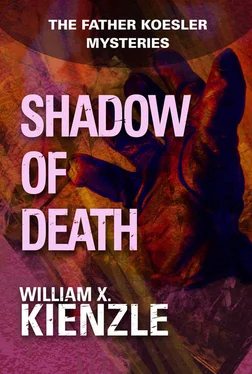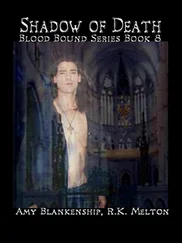“Ah, yes, Ramon. But you see, the bishops fall back on Biblical passages such as, ‘You have not called me but I have called you.’ And, ‘Behold, I will be with you unto the consummation of the world.’ So, they tend to look at this as God’s problem. They will pray about it and God will solve it.” Koesler spread his hands, palms up, as if indicating the solution had been miraculously found.
“But,” said Toussaint, “perhaps God’s solution is not theirs. Perhaps God’s solution is that others be called to the ministry. Women. Laicized priests. Married men.”
“Aha! You see, Ramon,” Koesler playfully nudged his friend’s arm, “you thought I was joking when I said you would be the first married Latin rite priest in centuries.”
Toussaint laughed. He was joined in the laughter by Koesler. Then the two became conscious of another presence. They looked up to see Inspector Koznicki, bigger than life, smiling down at them.
“May I join the conclave?”
“Inspector!” Koesler exclaimed, “we were just solving one of the major problems of the Church. On second thought,” he added ruefully, “as a matter of fact, we weren’t solving it, after all.”
“I hope you have some strength left in your fertile minds for the solution of an annoying residual problem of an attempt at murder,” Koznicki said good-naturedly.
“I thought you had that fairly well under control.”
“Thanks to the Reverend Toussaint here, we have a leg up on it, at least. But please: take your glasses and let us go in to our dinner.” The two had been so occupied with their discussion that they had not finished their drinks.
The maître d’ led them to the rear of the relatively small, reasonably illuminated restaurant. Once again, they found themselves in a secluded booth. Koesler wondered how Koznicki could arrange such consistent seclusion in country after country.
“How do you do it, Inspector? How do you find these out-of-the-way places? And how do you get these secluded booths?”
“Experience. Asking advice. This was—would have been,” he glumly corrected himself, “our fourth trip to Europe.”
“I miss Wanda too,” said Koesler, who knew that Mrs. Koznicki, sensing the Inspector’s increasing interest and involvement in this affair, had returned to Detroit in order that her presence would not take time from or interfere with his professional plans.
“Well, in any case,” Koznicki brightened; he was involved in an investigation and that helped fill the void, “we have our own list—of favorite eating places. And this happens to be one of them.”
The waiter appeared. Koznicki ordered a glass of sherry. His companions declined another drink.
“I should tell you the specialties of the house,” said Koznicki, as he opened his menu. “There’s Taramosalata, Arnaki Melitzanes, and Moussaka a Khirokitia.”
“Order what you will, Inspector. Ramon and I have decided to stick as close to all-American food as possible.”
“Then let me suggest the tiropetes as an appetizer—they’re just cheese puffs. Then the soupa avgolemeno; the salata Athenas; as an entree, either the keftedakia— meatballs—or kotopoulo riganato tis skaras— chicken. Perhaps green beans oregano or tomato pilaf for a side dish. And maybe just baklava for dessert.”
“The meatballs and green beans sound good,” said Koesler, “but no tomato pilaf, please—and I’ll pass on the dessert.”
“I’ll have the chicken and the pilaf—but, like Bob, I shall forgo dessert,” said Toussaint.
When the waiter arrived with Koznicki’s sherry, the Inspector ordered for the three and requested a bottle of Marvo Naoussis.
Once the waiter left the table, Toussaint leaned forward. “My sources tell me it is to be tomorrow evening at the ecumenical service in Westminster Abbey. They say both the British Cardinal and Cardinal Boyle are to be the targets. So we can anticipate more than one assailant.”
Koznicki smiled broadly. “Very good! Excellent! That will work out magnificently. We have been able to persuade both Cardinals Boyle and Whealan to remain in seclusion today and tomorrow until the service. And believe me, that was not easy.”
Koesler shook his head. “And all you’re trying to do is save their lives.”
“Well, they are strong-minded men,” Koznicki stated. “After talking with the Cardinals, I spent the rest of the afternoon with two of my friends from Scotland Yard going over a scale model of Westminster Abbey to check security arrangements.”
“Your friends, Inspector . . .?” Toussaint made bold to inquire.
“Assistant Commissioner Henry Beauchamp of the Central Criminal Investigation Department, and his subordinate, Charlie Somerset, Detective Chief Superintendent of the Murder Squad.”
“Is that S-o-m-e-r-s-e-t and B-e-e-c-h-a-m?” Koesler was writing the names on a small piece of paper.
“You have Somerset correct, Father. But the Commissioner’s name is spelled B-e-a-u-c-h-a-m-p.”
Koesler smiled. “He must have a problem like mine with people mispronouncing his surname.”
“I’m afraid the Commissioner does not share your problem, Father. Beauchamp is a rather common name over here. The British are at home with its pronunciation, which is, to our ears at least, how shall I put it . . . compressed. Something akin to the treatment they give to Worcestershire . . . or Cholomondely.” The Inspector gave the names their English due, which, to Koesler’s ear resembled something akin to “Woustershirr” and “Chumley.”
The priest almost blushed. “Uh . . . I thought that perhaps somewhere down the line I might be introduced to them, and I wanted to be familiar with their names.”
“Quite so, Father. I would be most appreciative if both you and the Reverend Toussaint would join me and the London police tomorrow evening.” Koznicki had sought Koesler’s help in previous investigations, especially when a Catholic element was inextricably involved.
Koesler glanced at Toussaint and caught his look of concurrence.
“We’d be eager to be of any help possible, of course, Inspector. Would you like us to . . . uh, rehearse, or something, tomorrow? We were going to catch some of the sights of London. But that certainly can easily be put off—”
“No, no; that will not be necessary, Father. We will want the two of you at hand tomorrow evening, though. There are places reserved for you. We have planned more than adequate police protection. But it is quite possible that your eyes might pick up something ours might miss. Or pick it up more quickly. As, indeed, did occur in St. John’s just last evening.” Koznicki nodded appreciatively at Toussaint. “Meanwhile, do take in the sights of London. There is much to see and you have but one day. Make the most of it, by all means.”
“Then, Inspector, you are satisfied with the security precautions?” Toussaint persevered.
Koznicki hesitated before replying.
“Of course one can never take too many precautions, nor have too much security, Reverend. If I had my preferences, I would prefer that the Cardinals not appear publicly, particularly not together. We will apprehend these conspirators, I am sure of it. In the meantime, it would be helpful if the targeted Cardinals could be persuaded not to expose themselves to danger.”
“Is it not true, though, Inspector,” said Toussaint, “that you might apprehend the conspirators more quickly if the Cardinals do turn out and are accessible to the general public?”
“Oh, much more quickly. But in that path lies the definite possibility, however slight, that the assailants might be successful and that their prospective victims may be injured . . . or worse.”
Читать дальше












